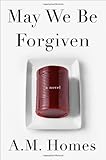 You can go home again. I’m barely living proof. I’m writing this on Thanksgiving, in my childhood home in San Antonio. I drove here from Austin last night, with my partner, Leela, and our three dogs. Downstairs, my mother is peeling potatoes and watching MSNBC. Leela is drinking coffee and making a pie crust. I’m staring at a bookshelf in the room where my brother, Randy, used to sleep — there’s Flann O’Brien, John Updike, Stephen Jay Gould. Randy died in 2010. This is my first Thanksgiving at home without him. I’m listening to Alejandro Escovedo sing “Five Hearts Breaking,” a song I’ve had stuck in my head ever since Leela and I crossed Loop 1604, on repeat: “Everything will be all right,” he promises, over and over again.
You can go home again. I’m barely living proof. I’m writing this on Thanksgiving, in my childhood home in San Antonio. I drove here from Austin last night, with my partner, Leela, and our three dogs. Downstairs, my mother is peeling potatoes and watching MSNBC. Leela is drinking coffee and making a pie crust. I’m staring at a bookshelf in the room where my brother, Randy, used to sleep — there’s Flann O’Brien, John Updike, Stephen Jay Gould. Randy died in 2010. This is my first Thanksgiving at home without him. I’m listening to Alejandro Escovedo sing “Five Hearts Breaking,” a song I’ve had stuck in my head ever since Leela and I crossed Loop 1604, on repeat: “Everything will be all right,” he promises, over and over again.
Ever since I came home, I’ve been thinking of the best novel I read this year, A.M. Homes’s stunning May We Be Forgiven. That’s not surprising — the book opens and closes with family Thanksgiving dinners, the first one dreadful, the second, triumphant. It’s the same family, except that it’s not — the protagonist Harold Silver and his niece and nephew are there at both dinners, but not much else looks the same. Harold’s wife, brother, and sister-in-law have all gone away. It happens.
In the years since I lost my brother, I’ve been thinking a lot about the moral force of literature, which didn’t mean much to me as a smirking faux-postmodernist teenager, but means everything to me now. May We Be Forgiven is a deeply moral novel, though it’s never moralistic. The characters cheat on their spouses; they lie and neglect and even murder. Homes keeps a distance throughout; she’s not judgmental, but neither is she naive enough to presume that we won’t, or shouldn’t, judge one another. One of the book’s main characters — in absentia, obviously — is the famously amoral President Richard Nixon, about whom Harold, a historian, is writing a book. Another character is the Internet, which ends up acting as both destroyer and redeemer:
There is a world out there, so new, so random and disassociated that it puts us all in danger. We talk online, we “friend” each other when we don’t know who we are really talking to — we fuck strangers. We mistake almost anything for a relationship, a community of sorts, and yet, when we are with our families, in our communities, we are clueless, we short-circuit and immediately dive back into the digitized version — it is easier, because we can be both our truer selves and our fantasy selves all at once, with each carrying equal weight.
You could call that moralizing, of course, but only if you’re completely oblivious — only if you’re too far gone to realize the difference between liking something and “liking” it. Don’t worry if you are; you’d be in good company.
It’s an unbearable cliché to say that a book can change your life, and the fact that sometimes it’s true, perhaps, doesn’t make it any less trite. I don’t know whether May We Be Forgiven has changed my life; if it has, it will be years before I realize how, or why. I do know that it’s affected me more than any novel I’ve read in years, and I do know that it’s a masterpiece.
And I know that it’s courageous, and an unambiguous force for moral good. If you’re too young or distant or callow to care about that, don’t worry — you will someday, and it’ll hurt like hell, and you’ll be glad, at some point, that it happened. May We Be Forgiven is a prayer, like the one I learned as a child in Catholic school, and found myself reciting a few years ago, over and over again: “Eternal rest grant unto him, O Lord, and let perpetual light shine upon him. May the souls of the faithful departed, through the mercy of God, rest in peace.”
I’m not a religious man, except maybe I am. All I know is that I don’t know. Whether we’re forgiven or not, may we be worthy of our families, the living and the dead, the ones for whom we’d give all we have. May we learn to forgive ourselves. May everything be all right. Amen.
More from A Year in Reading 2012
Don’t miss: A Year in Reading 2011, 2010, 2009, 2008, 2007, 2006, 2005
The good stuff: The Millions’ Notable articles
The motherlode: The Millions’ Books and Reviews
Like what you see? Learn about 5 insanely easy ways to Support The Millions, and follow The Millions on Twitter, Facebook, Tumblr.









